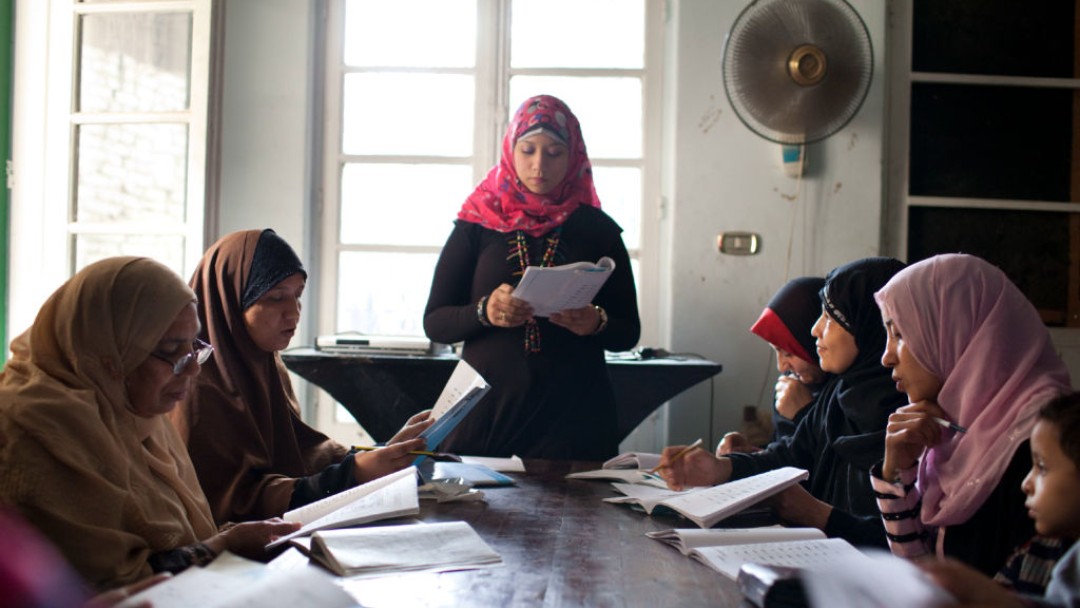
As of: 02/2024
Good training offers good opportunities on the labour market, both in Egypt and in Germany. Many young people in Egypt are unemployed. And many companies there are looking for skilled workers. The issue at hand: the education of young people does not match the needs of the economy as the curricula and equipment of the vocational schools are outdated. On behalf of the German Federal Government, KfW is promoting the rehabilitation of 20 vocational schools, the provision of modern equipment and energy supply via photovoltaics. In addition, three competence centres for renewable energies and energy efficiency will be established. Girls in particular are to be encouraged to complete training and also choose technical subjects. The need for skilled workers for the energy industry will increase in the future, as Egypt has many opportunities for the use of wind and solar power.
Unemployment in Egypt is high, especially among young people. At the same time, there is a shortage of skilled workers. The cause of this paradoxical situation is inadequate vocational training.
Around 850,000 young people enter the labour market every year. Half a million of them find employment in the informal sector, 120,000 are employed by private companies and another 100,000 by the government. Every year, 130,000 young people remain without work and without prospects. Many of them give up looking for a job because they do not see any opportunities.
Education is an important driver of economic growth. Egypt’s economy could expand further if there were enough skilled workers. However, the existing vocational schools are insufficiently equipped and the curricula are outdated. They often do not yet include modules on soft skills such communication or professionalism. Many teachers do not know the practices in companies themselves and are therefore unable to convey up-to-date knowledge. There is a lack of modern machines in workshops. There is often no cooperation with companies. Therefore, even graduates from vocational schools cannot find employment.

On behalf of the Federal Ministry for Economic Cooperation and Development (BMZ), KfW is supporting vocational schools in Egypt with EUR 38 million, of which EUR 20 million will be awarded in the form of a loan and EUR 18 million in the form of a grant. The EU mandate amounting to EUR 13 million can provide significant additional leverage for the investment. With the help of these funds, three competence centres for renewable energies and energy efficiency will first be set up. These schools in Menia, Assuan and Sharqiya will serve as examples of flagship projects. In addition, 20 vocational schools will be rehabilitated and equipped with photovoltaic systems. This serves as a sustainable energy supply on the one hand and as a practical example for the pupils on the other. The aim is to adapt the subject matter of training to the needs of the labour market. Cooperations with companies are planned for this purpose.
The teachers will be further trained in order to be able to provide the pupils with the latest knowledge. The vocational schools’ workshops will be equipped with modern technology. Opportunities for online learning will also be created.
Girls are to be targeted so that they also decide to attend training at the modernised schools. The labour force participation rate of women in Egypt has been very low thus far. Girls and women rarely take up technical professions, although they offer good income opportunities.
In the future, skilled workers in the energy industry will have good employment prospects. Egypt has great potential to use renewable energies. Trained specialists with expertise in energy efficiency, solar and wind power will therefore have good opportunities in the labour market of the future. It is estimated that up to 65,000 new jobs could be created in this industry in Egypt by 2030.
The project contributes to reducing unemployment among young people. At the same time, it supports businesses by meeting their need for skilled workers. Jobs are created and secured. Young people gain access to better prospects for the future. This contributes to the stabilisation of society.
The newly designed school rooms create a pleasant learning environment. Relaxation areas, gender-sensitive design and renovated sanitary facilities are intended to make it easier for families to encourage daughters to take these training courses. The additional focus on the education of girls contributes to gender equality.
Specialists in the use of renewable energies will be trained so that the country’s valuable natural resources can be used more effectively in the future.
The project contributes to the achievement of these following United Nations Sustainable Development Goals:
KfW Group
KfW Development Bank
Financial systems, education, governance
Share page
To share the content of this page with your network, click on one of the icons below.
Note on data protection: When you share content, your personal data is transferred to the selected network.
Data protection
Alternatively, you can also copy the short link: https://www.kfw-entwicklungsbank.de/s/enzBy5_n
Copy link Link copied